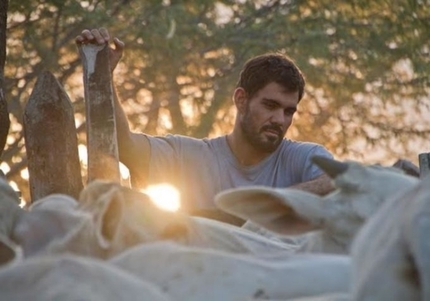Review: Gabriel Mascaro's NEON BULL Mingles Naturalism And Sensuality In Brazil

Brazilian helmer Gabriel Mascaro is a keen observer of human behaviors. With his documentary work, such as Housemaids, High-rise, he demonstrated his anthropological tendencies and lent sharp insights into complex Brazilian society while being playful and adventurous with the cinema medium.
His latest, Neon Bull, is his second narrative feature after critically acclaimed narrative debut, August Winds. Just as with August Winds, the film defies categorization.
Exquisitely lensed by Diego Garcia (Cemetery of Splendor), Neon Bull transports us to yet another marginal segment in Brazilian society. The title comes from Brazilian rodeo (vaquejada)- it involves two cowboys on their horses sandwiching the bull from both sides and taking it down by yanking their tails. Sometimes the show goes on at night and they put iridescent paint over the bulls, hence Boi Neon (Neon Bull). The film follows one such traveling vaquejada trope.
The slight, episodic narrative tells a story of Iremar (Juliano Cazarré), a hunky vaqueiro (cowboy) and his immediate surroundings. Iremar works for a vaquejada which makes him lead a nomadic existence, sleeping in a hammock and making use of outdoor showers. His makeshift family consists of a young cattle truck driver Galega (Maeve Jinkings) and her preteen daughter Cacá (Alyne Santana) and with two other ranch hands.
Getting bulls ready for the rodeo is a filthy job and vaqueiros are constantly covered in dust and cow dungs. But unlike his looming physique and the rough sport he deals with day in and day out, Iremar is no Jake LaMotta. He has different aspirations: he wants to be a fashion designer.
When he is not dusting bull's tails or shoveling cow shit, he is hunched over his tiny sewing table, working away the nights or drawing designs over naked bodies in fellow cowhand's porn magazines. Using Galega as his model (she works as an exotic dancer in his outfit with a horse mask over her head), Iremar horns his skills and dreams of getting a professional sewing machine.
Neon Bull might be deceptively simple at a first glance, but the film's much more complex on both theme and form. Not only Mascaro plays with the notion of machismo in cowboy and Brazilian culture in general, he also applies same matter-of-fact life observations in nature documentary to his human characters. Animal and human sexuality and bodily needs are depicted in a very natural manner (Cazarré's sculpted body is often shown full-frontal). Neon Bull features some of the most sensual, long sex scenes (involving a very pregnant woman, no less) depicted in recent film memory.
Mascaro thrives in authenticity that he cultivated in his documentary days and makes full use of it in this 'ordinary people with their small dreams' narrative. He gets spectacularly naturalistic performances out from his cast - most of his actors are non-actors playing characters pretty close to themselves.
The narrative pull is a little more consistent here than in August Winds. But as in his other films, the director's interest is elsewhere. While keeping a distance, the director zeroes in on a specific societal spectrum, stripping it down to a base level. There he strives to capture the truth in human condition. The result is incredibly rich, intimate, warm portrait of human desire, jealousy, folly and dreams.
Neon Bull played in this year's ND/NF. It makes a theatrical premiere on April 8 at FSLC. Gabriel Mascaro's retrospective: Ebbs and Flows runs April 15-21. Please check out FSLC website for more info.
Dustin Chang is a freelance writer. His musings and opinions on cinema and beyond can be found at www.dustinchang.com
Neon Bull
Director(s)
- Gabriel Mascaro
Writer(s)
- Gabriel Mascaro
Cast
- Juliano Cazarré
- Maeve Jinkings
- Josinaldo Alves
- Roberto Berindelli

Do you feel this content is inappropriate or infringes upon your rights? Click here to report it, or see our DMCA policy.






